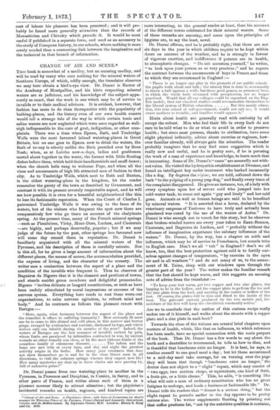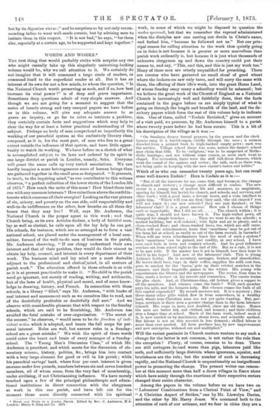CHANGE OF AIR AND SCENE.* Turs book is somewhat of
a medley, but an amusing medley, and will be read by many who care nothing for the mineral waters of Southern Europe, of which, oddly enough, the translator observes we may here obtain a bird's-eye view. Dr. Donne is Rector of the Academy of Montpellier, and his hints respecting mineral waters are so judicious, and his knowledge of the subject appa- rently so exact, that the work is one which may be of service to invalids or to their medical advisers. It is evident, however, that fashion has more to do than therapeutics with the popularity of bathing-places, and the history even of our own health resorts would tell a strange tale of the way in which certain tonic and saline waters are now neglected which were once regarded as well- nigh indispensable to the cure of gout, indigestion, or other com- plaints. There was a time when Epsom, Bath, and Tunbridge 'Wells were the most favoured inland watering-places in Great Britain, but no one goes to Epsom now to drink the waters, the Bath of to-day is utterly unlike the Bath presided over by Beau Nash; when, as at Loeche now-a-days, ladies and gentlemen moved about together in the water, the former with little floating dishes before them, which held their handkerchiefs and snuff-boxes; when the church bells rang to welcome Pope, and when all the vices and amusements of high life attracted men of fashion to that city. As to Tunbridge Wells, which next to Bath and Buxton, is the oldest watering-place in the kingdom, let the reader remember the gaiety of the town as described by Grammont, and contrast it with its present severely respectable aspect, and he will see how possible it is even for a beautiful neighbourhood like this to lose its fashionable reputation. When the Court of Charles I. patronised Tunbridge Wells it was owing to the fame of its waters, but of the visitors who frequent the spot now there are comparatively few who go there on account of the chalybeate spring. At the present time, many of the French mineral springs —such as Plombieres, Vichy, Mont-Dore, Luchon, and Cauterets —are highly, and perhaps deservedly, popular ; but if we may judge of the future by the past, other springs less favoured now will some day exceed them in reputation. Dr. Donne is familiarly acquainted with all the mineral waters of the Pyrenees, and his description of them is carefully minute. Nor is this all, for he gives a large amount of information about the different places, the means of access, the accommodation provided, the expense of living, and the character of the scenery. The writer sees a conhection between the aspect of a place and the condition of the invalids who frequent it. Thus he observes of Bagneres de Bigorre that it is the cleanest and prettiest of towns, and stands amidst green meadows and delightful promenades.
Bigorre "invites delicate or languid constitutions, or such as have been unduly stimulated by moral impressions or excesses of the nervous system. Everything here tends to rest these worn-out organisations, to calm nervous agitation, to refresh mind and body." And he contrasts as follows this pleasant resort with Bareges :—
" Here, again, what harmony between the aspect of the place and the remedies it offers to suffering humanity ! How seriously ill must one be to come to this dismal and cold place, in this narrow and barren gorge, ravaged by avalanches and torrents, darkened by fogs, and which wolves only can inhabit during six months of the year! Indeed, the waters of Baregos are the last resource of invalids racked by pain, whose limbs are paralysed by infirmities contracted in war, by ancient wounds no other remedy can close, or by the most hideous kinds of the
countless family of cutaneous diseases The infirm and the lame are met with at every turn, and day and night the greatest activity reigns in the baths. How many i;oor creatures that dare not show themselves go to and fro in the close litters seen in all directions, to visit the salutary springs whence they expect new life! How many mysteries are shut up in those chairs one sees passing by, full of unknown pains!"
Dr. Donne passes from one watering-place to another in the Pyrenees, in Provence and Dauphine, in Corsica, in Savoy, and in other parts of France, and writes about each of them in a pleasant manner likely to attract attention ; but the physician's incidental remarks on health, regimen, and kindred topics are
Change of Air and Scene. A Physician's flints; with Notes of excursions for Health amongst the Watering-Placa of the Pyrenees, France (Inland and Seaward), Switzerland, Corsica, and the Mediterranean. By Alphonse Donne, BLD. London: Henry S. Sing and Co. 1872.
more interesting, to the general reader at least, than his account of the different towns celebrated for their mineral waters. Some of these remarks are amusing, and some upon the principles of hygiene are, to say the least, novel.
Dr. Donne affirms, and he is probably right, that there are not six days in the year in which children require to be kept within doors on account of the weather, and he is strongly in favour of vigorous exertion, and indifference if persons are in health, to atmospheric changes. " Do not accustom yourself," he writes, "to look upon your person as so very precious ;" and be regrets the contrast between the amusements of boys in France and those to which they are accustomed in England :—
" There is no longer any play in the grounds of our public schools the pupils walk about and talk ; the utmost that is done is occasionally to throw a ball against a wall ; but those good games, as prisoners' base, in which the whole body streamed with perspiration, are no longer practised. Would that all our colleges could be organised on the Eng- lish model; that our classical studies could accommodate themselves to the liberal system of British education But this manly educa- tion, this true school of self-government, would not suit us ; it would cause mothers to tremble, and families would oppose it."
Hints about health are generally read with curiosity by all except the robust. Men who feel their life in every limb do not care to be told what to do or what to avoid in order to preserve health ; but since most persons, thanks to civilisation, have some slight physical infirmity, advice about exercise or regimen, how- ever familiar already, will always gain the attention. The reader probably imagines that he may find some suggestion which is really new and useful, and he is pretty sure, if he is perusing the work of a man of experience and knowledge, to learn much that is interesting. Some of Dr. Donne's "cases" are assuredly not with-
out value. He visited the hydropathic establishment at Divonne, and found an intelligent boy under treatment who barked incessantly like a dog. By degrees the 'ignite, we are told, softened down the bark "to the yelping of a young pug-dog," and finally every trace of the complaint disappeared. He gives an instance, too, of a lady with every symptom upon her of severe cold who jumped into her
cold-water tank, to come out again "gay and lively" and her cold gone. Animals as well as human beings are said to be benefited by mineral waters. "It is asserted that a horse, declared by the veterinary surgeons of Toulouse to have truly and actually been glandered was cured by the use of the waters of Aulus." Dr. Donne is wise enough not to vouch for this story, but he observes that broken-winded horses are every year taken to Eaux-Bonnes, Cauterets, and Bagneres de Luchon, and "probably without the influence of imagination experience the salutary influences of the waters." Dr. Donne, by the way, has a chapter on colds and influenza, which may be of service to Frenchmen, but sounds trite to English ears. Don't we all " tub " in England ? don't we all know, too, that the best protection against cold is to fortify our- selves against changes of temperature, "by exercise in the open air and in all weathers "? and do not many of us, to the amaze- ment of M. Taine, sleep with our windows open through the greater part of the year? The writer makes the familiar remark that the feet should be kept warm, and this suggests an amusing note of advice from the translator :—
" To keep your feet warm, get two copper and two zinc plates, the lapping to be in the hollow, and the copper plate to go from tho too and the zinc plate from the heel, and meeting in the centre or hollow of the foot. Of course, the plates will be thin and fitted to the inside of the boot. The galvanic current produced by the two metals and the moisture of the feet will keep the circulation constantly active."
Are we to conclude that the author of this curious recipe really makes use of it himself, and walks about the streets with a copper plate and a zinc plate in each boot?
Towards the close of the volume are several brief chapters upon matters of health, which, like that on influenza, to which reference
has been made, have no special connection with the main purport of the book. Thus Dr. Donn6 has a few words to say about the teeth and a dentrifice to recommend, he tells us how to dine, and
is thankful that luncheons exist no longer. It is best, he says, to confine oneself to one good meal a day ; but let those accustomed to a mid-day meal take courage, for on turning over the page they will learn that though "luncheons exist no longer," the
doctor does not object to a " slight " repast, which may consist of "two eggs, two mutton chops, or equivalents, one kind of fruit, a fruit-pie, or a little cheese." This, he adds, "is something like what will suit a man of ordinary constitution who has no great fatigues to undergo, and leads a business or fashionable life." Dr. Donne tells his readers that "dinner is a serious thing," but the slight repast he permits earlier in the day appears to be pretty
serious also. The writer supplements Banting by pointing out that coffee produces fat, "not by the nutritive qualities it contains, but by its digestive virtue ;" and he surprises us by not only recom- mending ladies to wear well-made corsets, but by advising men to imitate them in this respect. "It is not bad," he says, "for them also, especially at a certain age, to be supported and kept together."







































 Previous page
Previous page